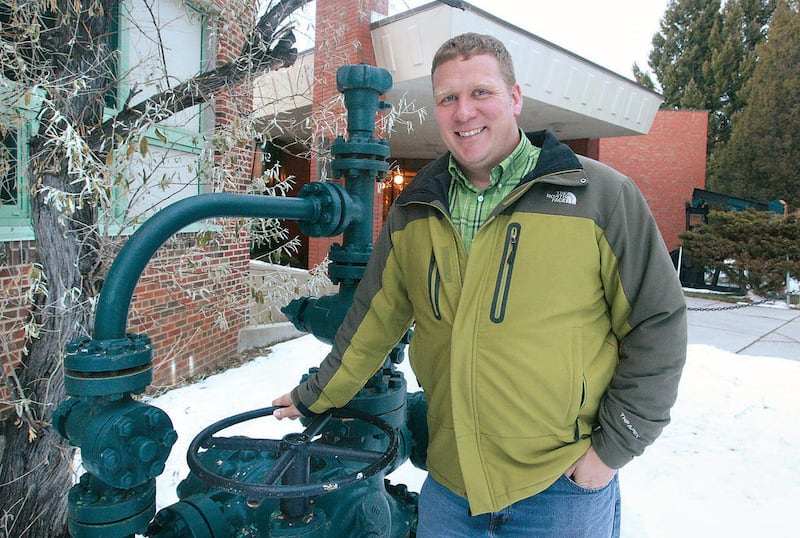BUTTE, Mont. — Eric Jacobsen had been called to some tough assignments before.
The British Petroleum employee and the Montana Tech petroleum engineering graduate has responded to places as varied as Algeria and Azerbaijan, often in the wake of problems or near-catastrophes at BP oil rigs around the world.
Jacobsen, 40, based in Helena, was in Canada on April 20 when he received word that Deepwater Horizon, a BP offshore oil platform in the Gulf of Mexico, had exploded and sank.
"As soon as we saw the pictures, and later learned that 11 (people) had died, we knew it was a huge deal, a crisis," he said during an interview last week at Tech.
But providing good leadership in times of crisis is Jacobsen's forte. A natural leader, Jacobsen was starting quarterback of the Tech football team from 1988 to 1992, was elected captain and led the team to conference titles.
"He had exceptional leadership when we got him," said coach Bob Green, who has remained friends with Jacobsen.
"People gravitate towards him. I like to say he had a good way about him. He could be a leader without being bossy."
But rallying a football team doesn't quite compare to stopping an oil blowout more than 4,000 feet below the sea, accessible only by remote-operated underwater vehicles.
Plus the world was watching.
"It was the perfect storm," Jacobsen said. "Everything lined up to allow this catastrophe to happen."
For two months, he watched his company's name get dragged through the mud.
Idea after idea for stopping the spill — fixing the blowout prevention device, building a containment dome and drilling heavy fluids into the pipe — failed to fix the problem.
In early June, Jacobsen finally got the call to help find a solution. BP was considering a new plan called "static kill," which would funnel a stack of drilling mud into the well and insert a flange that would help relieve pressure.
As BP's worldwide program manager for operational leadership and development, Jacobsen had worked to train employees on how to handle situations like this, and, as an operations manager on the ground, he had dealt with similar dilemmas.
He was first sent to the BP crisis center in Houston and, after a short briefing, flew via helicopter to the spill site. He was first tasked with leading a rig that would burn off as much escaping oil as possible in order to limit the damage to the fishery and coastal beaches.
The small ship burned 24 hours a day, and a huge dandelion of 30-foot flames danced above Jacobsen's head. A few days later, when it was time to initiate "static kill," he was brought back to Houston and assigned to lead the team that would create and execute the mission, as well as coming up with a contingency plan if things didn't go as expected.
Jacobsen said he and a number of engineers were confident in the science behind their idea, but they had to work flawlessly and get a little lucky if they were to stop the leak.
On the day they got to work, Jacobsen said, the crisis center was completely silent as they watched the progress on underwater cameras.
"We were in face-puckering mode, just hoping this would work," he said.
Initially, it did. Oil stopped flowing into the gulf for the first time in more than three months.
But Jacobsen and the rest of the crew knew they weren't out of the woods.
"There was a brief sense of relief followed by 72 hours of anxiety," he said.
A slight leak in the flange forced the crew to count, for days on end, the air bubbles that were escaping. But it didn't seem to be getting any worse, and, after a few days, and then a few weeks, it became clear that the cap would hold and oil would not be forced out somewhere nearby.
Once the crisis was over, Jacobsen sat down to think how his company, and the industry in general, could avoid similar disasters in the future. He had been a BP employee since a summer internship at the Butte Superfund site and worked his way up to management through outposts such as Venice, La., near where the Deepwater Horizon would later explode.
He said a big-picture look at industry safety, including more stringent procedures on "things that go boom and things that blow up," can help reduce risks. But so are better regulation, improved technology and more checks-and-balances in each company, he said.
Jacobsen looked back to his time at Montana Tech, where he said he was taught "technical, practical leadership" and "to work hard and never give up." He said those are the types of characteristics that are going to make the oil and gas industries safer and cleaner and more efficient long into the future.
In the eyes of his old football coach and friend, Green said, the industry already has the man for the job.
"The more stuff he does, the better for all of us," Green said.

